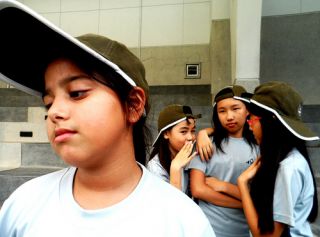Friends
When Teased Children Grow Up
The effects of being shunned as a child continue far beyond the playground.
Posted April 14, 2013
Many people have an idyllic image of the rural one- or two-room school. The classes are small. The teachers give individual attention. The older children help those younger or less advanced than themselves. What is there not to like?

Many people have an idyllic image of the rural one- or two-room school. The classes are small. The teachers give individual attention. The older children help those younger or less advanced than themselves. What is there not to like?
The two-room school I attended from kindergarten (all two weeks of it) through eighth grade did, at times, conform to the Little House on the Prairie image. Its name was Happy Valley. There were only two other children in my grade and a little over one dozen in the entire school. I had the same teacher until sixth grade. All of us had a lot of flexibility in terms of being able to take more time when we needed it or to work ahead, even into the next grade's books and beyond.
But what I remember most from those years is something very different: persistent, daily, unrelenting teasing. Not bullying, necessarily. Just teasing.
I don't remember when the problem began, but I do remember going from a girl who couldn't wait to go to kindergarten and who "played school" every chance I got, to begging to stay home because of stomachaches and headaches. My mom told me that in about third grade I changed from being open and bubbly to trying not to be noticed, and it was at about that time that I finally mentioned something to her about an incident at a school Christmas party, the details of which are complicated but that involved being excluded in a very public way. My mom talked to the teacher, who then had a conference with nearly every child in the school and even some of their parents. The topic of discussion, much to the mortification of my introverted self, was me. One problem with being the object of teasing in such a small school is that there is nowhere to hide, no group of fellow Breakfast Club outcasts to join.
Looking back, I see that I was ripe for teasing. I was a quirky girl who liked to pretend to be characters from my favorite books. I remember clearly going through a Heidi phase, including serving myself snacks of plain bread and hunks of cheese, just as Grandpa made for Heidi and Peter (the difference being that my slabs were cut from big blocks of government cheese, distributed on the Rosebud Indian Reservation where we lived and traded to us for eggs). I wore thick glasses that did not correct a tendency for crossed eyes caused by a congenital condition—not diagnosed until I was in college—called Duane Syndrome.
But do not worry: this is no story of self-pity. I was a teaser myself, often using a quick and even sharp tongue to make up for my awkwardness in social situations. I was quite confident ("snotty"), assertive ("bossy"), imaginative and nervous ("just plain weird"). In current parlance, I was also in severe need of interpersonal communication skills.
Perhaps because of my own experience, I am wary of the pat advice that all children just need to learn how to take teasing. While it is true that teasing is a part of life and can be done in a playful way, I have yet to meet a single person who feels that the experience of being teased helped her simply to shrug off the feelings or effects, or that it made him a better person. In a SmartGirl.org survey about teasing, respondents indicated that they were teased most often about their appearance, friends, grades, and weight. How many young sensitive girls (or boys) can shrug off negative comments, however playful, about these things?
In an article for parents about teasing, Dr. Patricia A. Schuler offers this advice:
"What shouldn't parents do? Don't minimize the situation by suggesting that everyone gets teased. Telling children it's their problem and to stand up for themselves only makes them feel even more inadequate and powerless. Don't call the teaser and 'reward' him/her with an invitation to discuss and negotiate a plan to stop the teasing by offering rewards. Don't call the teaser's parents to complain. It may make the situation worse."
In my forties, I read Jerry Spinelli's Stargirl, and many of the memories of those grade school years came rushing back to me. Stargirl is the story of a new girl in school who is shunned for being different. At one point, she enlists the help of the narrator to learn how to fit and be popular: "She constantly quizzed me about what other kids would do, would buy, would say, would think. She invented a fictitious person whom she called Evelyn Everybody. 'Would Evelyn like this?' 'Would Evelyn do that?'"
In my case, once the student-teacher conferences were over and the dust had settled, I had made two decisions. The first was that I would study the other children and learn how to fit in better. I began to dress like them, talk like them, like what they liked, not like what they didn't like. In grade school, I was only partially successful in my project, but by the time I went to our county-wide high school and had a fresh start, I was a pro. I had friends. I was soon elected to student council. All the comments in my yearbooks were "To a really nice girl" and encouraged me to "Stay just the way you are. Don't change." I smiled until my cheeks hurt. I laughed at everyone's jokes. I became whomever I was with. I offended no one.
I was very, very good at it.
But if you had asked me what my favorite music was, or movie or book, or what was unique about my inner experience, or what my opinion was about anything, important or otherwise, I wouldn't have been able to tell you. It took years and years to undo the self-transformation I undertook in grade school, and just as long to begin to realize that my desire not to be teased had become confused with a desire to please everyone, all the time, an impossible if not soul-draining task. What a relief it was in my thirties to begin to get to know myself, all over again. It's a continual work in progress.
The second decision grew from something the teacher told me after those embarrassing conferences. She said that the main teaser in the school had, in years past, been the object of chronic teasing herself, and that this had been a pattern in the school for years: someone who was targeted for teasing when young grew into the role of the teaser ring leader.
Hearing this, I vowed that would never happen to me, that I would not forget what I felt like then, and that I would not exclude or judge anyone, ever. I haven't been always perfect, but I become more committed to my early promise to myself as I grow older, especially after becoming a parent. It's not always an easy promise to keep. I feel extreme discomfort when a friend or group speaks negatively about a mutual friend, and sometimes I back away from a relationship rather than participate or even listen. Such seemingly harmless gossip is not the same as teasing, I know, but the result is still that of exclusion, an us vs. them attitude, which is, after all, what teasing is often all about, drawing lines between the teased and the teaser, between who gets to laugh and whom is laughed at, and that's what I react to in a deep, visceral, physical way, even when I know I am over-reacting.
I also tried to remember what the teacher had told me, that many habitual teasers may be acting out old dramas of their own, in part because of shame. When I entered high school, I begged my former classmates not to tell anyone about my old self at Happy Valley, for fear that potential new friends would see past the "new and improved me." Decades later, if I think about those early years for any length of time, shame washes over me like a hot wind. I can easily see how this shame could lead some people to lash out in an effort to take back some control of their feelings, even at the expense of others. Childhood teasing may also be linked to social anxiety disorder, causing adults to withdraw habitually from social settings that they find threatening.
I know that many readers might enjoy teasing and may be thinking that being teased just isn't a big deal. Your family might tease as a matter of course, perhaps good naturedly. You might be confident that others know that you tease because you love them, or you might even believe they like to be teased. You might think that someone who doesn't enjoy teasing doesn't have a good sense of humor. Or you might tease because you haven't developed other communication skills, or because you aren't comfortable with direct confrontation. One can even make the argument that teasing has important educative value.
Surprisingly, I don't rue my own experience. I believe it has made me more compassionate, more able to provide a safe social space for the children and young adults I teach, and more aware that even the most competent and successful adults may be harboring painful memories that shape their current behavior.
At the same time, Gretchen Rubin's childhood experience, which she shares on her Happiness Project blog, sounds like heaven to me:
"[W]hen I was growing up, my family didn't tease much. Teasing, sarcasm, playful put-downs...none of that. And that made for a very nice atmosphere."
What's not to like?
What is your experience with teasing and being teased? How do you feel about teasing?
This article is adapted and updated from a blog post first published in 2009. Photo made available by http://www.flickr.com/photos/53771866@N05/ under a Creative Commons Attribution-ShareAlike 2.0 Generic License.
Connect with Lisa through her website, Facebook and Twitter.




